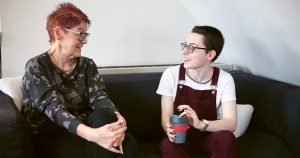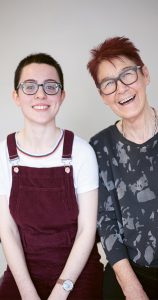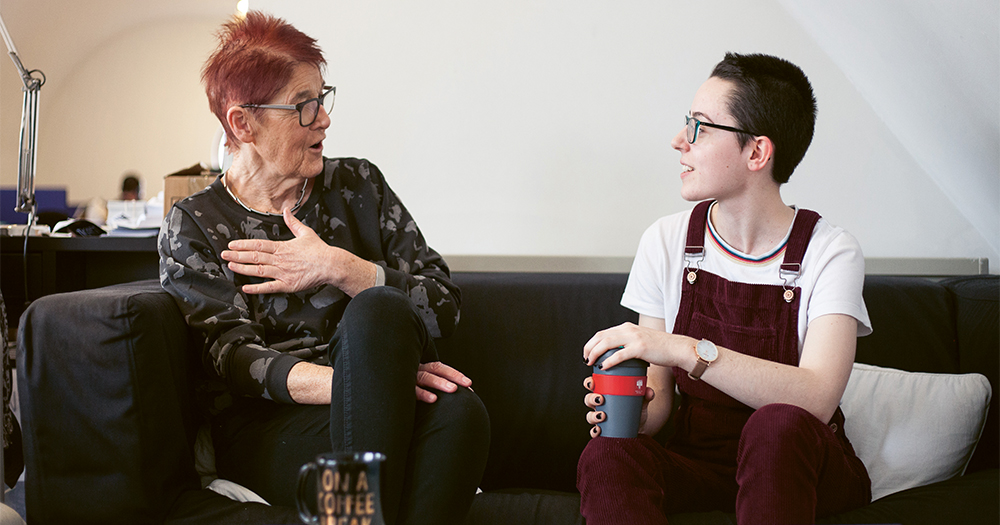In a series of discussions, members of our community talk through generational lines about how we grow, adapt and take care of ourselves. In this discussion, Ailbhe Smyth, Co Director of Together For Yes, speaks to Emily O’Connell.
Ailbhe And Emily
Ailbhe: When I came out you really had two options in Ireland – you could either be a gay man or you could be lesbian. One of the things I think is brilliant now, you actually get to think about where you are on that whole spectrum of sexuality. It was pretty narrow way back then.
Emily: Do you think you knew people back then who would identify differently now?
Ailbhe: Who knows, because it wasn’t part of our vocabulary, the words weren’t there, the language wasn’t there. It was very difficult when I came out as lesbian. I was already in my late 30’s and I had a daughter. It was even more stigmatised to be a lesbian than be a gay man. I’ve often thought I might well have described myself as just simply non binary. Which is not to say I’m not happy being lesbian, but if I’d had other ways of thinking about my sexuality. What about you?
Emily: I identify as lesbian but feel androgynous is the word. People kind of use that to describe style but I feel that in my personality as well. Because I’m a woman there’s things that happened to me that wouldn’t have happened otherwise, so it is part of my identity.
Ailbhe: I’m a very strong feminist, standing up for women is really important to me.
Emily: The All Ireland Student Activist Network had their Rise weekend in Cork a few weeks ago, and that was the first time I was at a discussion and talked about being an activist, and having to look after your mental health. It wasn’t until after we had the discussion I realised there were loads of times where I had spiralled down just because I was so tired. So I’m actually still trying to learn how to deal with that.
Ailbhe: I think we’re all looking for those tips. But at a very important level it’s about being aware of where your feelings and your mood is going and what is it around you that’s making you feel like that. That makes it easier, if you can say something has to give. I had mental health problems when I was in my 20’s with very severe depression and anorexia. And it was really only in my 30’s that I began to come out of that and understand that this wasn’t just about me, this was also about the environment I was in.
Emily: Because you’ll always think it’s just you and just how you are.
Ailbhe: You can take responsibility for your mental health, but you also have to look at the system, the culture you are a part of and how it has impacted on you. I always think when people say ‘as an activist how do you look after yourself’ and I think I enjoy being an activist, it gives me energy!
Emily: It’s like a lot of people really don’t want to be an activist but feel like they have to get involved. But for you it’s just something that you do.

Ailbhe: Temperamentally, if I am two days without a cause I’m thinking, what am I going to do, what is going on?! But on Sunday I was really tired, it was a very busy week and we had the homelessness rally, so I did that disengagement thing, I rang a couple of people and said sorry, I can’t be doing anything today. Do people of your age talk about health?
Emily: I find that my group of LGBT friends are way better at talking about stuff like that.
Ailbhe: Why do you think that group is better at speaking about it, is it to do with their sexuality?
Emily: I think it is, and it’s often the people who came out younger because they went into spaces like BeLonG To and learned that you should be looking after yourself. I think when you’ve gone through coming out really young you have to deal with a lot of stuff.
Ailbhe: What age were you when you came out?
Emily: I came out to my friends when I was 15 and to my family when I was 16.
Ailbhe: So you were very young really.
Emily: You said you didn’t come out till later.
Ailbhe: In my 20’s it didn’t really occur to me. Maybe I didn’t know you could be lesbian, so it was more so through the women’s movement and working with women.

Emily: I can’t remember ever not knowing.
Ailbhe: That’s a generational difference, things have opened up so much more. I came out to other lesbians, but in a very real way who else could I come out to? My family actively didn’t want to know. When I would be introduced on radio programs, you know I would say ‘I’m a lesbian feminist’, they would say ‘feminist Ailbhe Smyth’. Nobody wanted to use the word.
Emily: A big thing for me is the over sexualisation of lesbians, usually by heterosexual men.
Ailbhe: That was more covert when I was young because pornography didn’t have the same impact culturally. Whereas I didn’t really experience that, it was more the complete silencing of your existence. I always make a point if I get asked to speak at Pride to say at some point – ‘let’s hear it for the lesbians’! And all the women cheer. Because you don’t actually hear that very often, you don’t hear our history being out there.
Emily: We know older gay men here who will talk about the culture, but we know nothing about the lesbian community in Ireland before the ’90s. We really need to document that because we have such an amazing history. It’s probably very tied in with the feminist movement.
Ailbhe: Lesbians were always among the leaders of Irish women’s liberation in the ’70s and then in the ’80s in the years of austerity, we survived, we built things, we continued to go out and have fun, we made families. So we need these stories, we have all these generations and there’s so much there. I think it’s really positive and empowering for people to know that you have a history.
© 2018 GCN (Gay Community News). All rights reserved.
Support GCN
GCN is a free, vital resource for Ireland’s LGBTQ+ community since 1988.
GCN is a trading name of National LGBT Federation CLG, a registered charity - Charity Number: 20034580.
GCN relies on the generous support of the community and allies to sustain the crucial work that we do. Producing GCN is costly, and, in an industry which has been hugely impacted by rising costs, we need your support to help sustain and grow this vital resource.
Supporting GCN for as little as €1.99 per month will help us continue our work as Ireland’s free, independent LGBTQ+ media.

